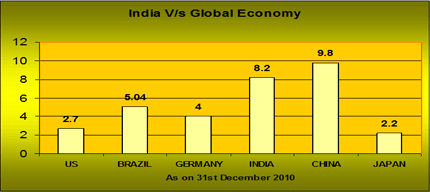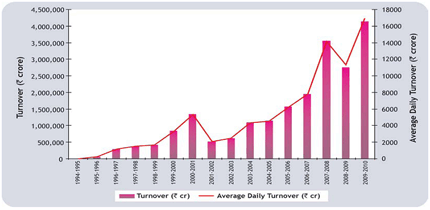|
Indian Economy – An Overview
|
|
- The Indian Economy has emerged with remarkable rapidity from the slowdown caused by the global financial crisis of 2007-09.
- With growth in 2009-10 now estimated at 8.0 percent by the Quick Estimates released on 31st January 2011 and 8.6 percent in 2010-11 as per the Advance Estimates of the Central Statistics Office (CSO) released on 7th February 2011, the turnaround had been fast and remarkable.
|
| Indian Vs Global Economy |
|

|
|
| Outlook |
|
- Notwithstanding the tightening money markets and moderate growth in deposits, the financial situation remained orderly with a pickup in credit growth, vibrant equity market and stable foreign exchange market.
- Though downside risks of global events, particularly movement in prices of commodities like crude oil (exacerbated by political turmoil in the Middle east) remain, the Indian Economy is poised to further improve and consolidate in terms of key macroeconomic indicators.
|
| Growth of Indian Capital Market |
|

|
|
| Why PMS |
|
- Managing wealth has become complex.
- PMS recognizes the disparate needs of investor and is a sophisticated and customized product offering.
- PMS offers high personalized service levels and constant interaction with clients.
- In summary, PMS is about assigning Experts to advise and to give superior returns to investor.
|
|
| Why IFIN |
|
- Professional services from the stable of a Legendary Financial Institution with focus on Safety, Trust & good returns.
- Manages your wealth with experienced investment professionals in a disciplined manner.
- Strict adherence to guidelines/processes.
- Discretionary portfolio management services designed for your specific financial needs.
- Fund Management – Proactive & Reactive.
- Monthly Portfolio report.
- Dedicated customer service desk
|
| Outline of IFIN Portfolio Management Schemes |
- Objective - To achieve wealth creation by way of investment in well managed frontline Corporate.
- Philosophy - Focus on long term returns with investment in large cap Shares available at reasonable valuations.
- To earn stable, consistent returns over the Medium to Long Term.
- Strategy - Identification of stocks by using in-depth fundamental research.
|
| IFIN PMS Scheme Offerings |
|
- LLF (Large cap Long term Fund)
- MMF (Multi-cap Multiplier Fund)
|
| LLF (Large cap Long term Fund) |
|
| Scheme Outline |
|
- Objective - To achieve wealth creation by way of investment in well managed frontline Corporate.
- Philosophy - Focus on long term returns with investment in large cap Shares available at reasonable valuations.
- To earn stable, consistent returns over the Medium to Long Term.
- Strategy - Identification of stocks by using in-depth fundamental research.
|
| Features |
- With scheme LLF, one gets exclusive portfolio to match Long Term Investment Preferences.
- Investment in Large Cap Companies with Good Corporate Governance and Long Term Growth.
- Investment in Top 20-30 Companies based on Market Capitalization.
- Exposure to Derivatives within the permissible limits.
|
| MMF (Multi-cap Multiplier Fund) |
| Scheme Outline |
- Objective - To deliver good returns in short to medium term by investing in momentum stocks with active churning of portfolio
- Identification - Scrip which are at the threshold of a breakout and which can yield good returns in short to medium term.
Focus is on absolute returns under all market conditions by trading with well defined money management rules.
- Strategy - Identifying the right time to invest in fundamentally good stocks. Tools of technical analysis & derivative strategies for hedging will be used where necessary.
|
| Features |
- With Scheme MMF, one gets exclusive portfolio access to Large Cap, Mid-Cap and Small-Cap Stocks.
- Investment Combination of 25 to 30 Stocks.
- Optimal Mix of Derivative strategy within permissible limits.
- Other Investment options in IPO’s and FPO’s, Bond and Debt Product in general.
|
|
Features |
| Investment Horizon | Short Term, Medium Term & Long Term. |
| Minimum Portfolio Size | Rs. 10 Lakhs |
| Fee Structure | Brokerage @ 0.50 %. |
| Management Fees | 2 % on the Net Asset Value (charged 0.50% every quarter on 31st Mar, 30th Jun, 30th Sep & 31st Dec). |
| Profit Sharing | 20% of Profits to IFIN on returns above 15%. |
|
|
|
|
| Choice of Schemes |
- If Investor Profile is
- Conservative
- Staying Power
- Long Term Vision
- Moderate Risk
- Steady Returns
|
| Recommended Scheme is LLF (Large cap Long term Fund) |
- If Investor Profile is
- Aggressive
- Risk taking ability
- Short / Medium Term Vision
|
|
| Recommended Scheme is MMF (Multi-cap Multiplier Fund) |
|
| Allocation of Funds for LLF (Large cap Long term Fund) |
|

|
|
| Allocation of Funds for MMF (Multi-cap Multiplier Fund) |
|

|
|
| Getting Started |
|
- Complete Documentation
- Open a Broking Account with IFIN
- Open a separate HDFC Bank Account with a minimum deposit of Rs.10,000/- for Corporate and Rs.2,500/- Individuals.
- Open a separate NSDL Demat account with IFIN.
- Monthly Report to Clients & Exclusive Customer service representatives to assist the clients.
- Get PMS, Bank, Depository Accounts activated
- Get RBI permission for Portfolio Investment Scheme (In case of NRI Clients)
|
|
| Risk Factors |
|
- Normal risk associated with equities exposure.
- Past performance no guarantee for future performance
- For Detailed risk factors – refer disclosure document.
|
| |